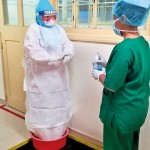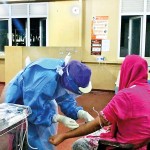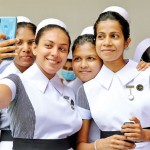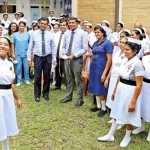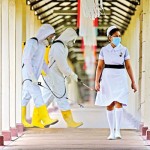News
Nurses draw on family strength in wrestling virus
- In spite of being in the frontline in the battle against COVID-19 these nurses at the NIID had time for smiles and selfies as they marked their day, on Tuesday, May 12. Pix by Lahiru Harshana
At the main hospital treating patients infected with the new coronavirus, the usual white nurse’s uniform has given way to personal protective gear, as nurses distribute medicines and draw blood samples.
Behind the success story of dozens recovering and being sent home from the National Institute of Infectious Diseases, are nurses who have not seen their families for weeks, or even months.
They treat patients with care and concern clad in suffocating protective clothing and risking their lives to save others.
“There was fear. We feared whether it will affect us, or whether we will carry the virus to our loved ones. We heard about health care workers around the world falling sick. We used to wear masks, gloves to protect patients from getting any germs from us, but now we had to protect ourselves from patients,” said Shyamalee Perera, 54, a senior nurse at IDH for 27 years.
“There was panic among staff, on how we will handle a global [virus] pandemic, if Sri Lanka will be affected severely. Nurses with young children at home and those were unable to travel to hometowns were seen calling their homes assuring they will be fine and telling how they miss their babies. Some nurses sent their families back to their villages and took shelter in boarding houses, while others stayed in nurses’ quarters,’’ Ms. Perera said.
Despite the fears, nurses at the IDH were ready and trained to face global pandemics with preparedness drills during outbreaks of Severe Acute Respiratory Syndrome (SARS), swine flu, avian flu, Middle East Respiratory Syndrome (MERS) and Ebola.
“We were aware of how to handle a situation like this, as we had been given guidelines and training. We trained junior nurses, minor staff as well as incoming patients. It was no easy task wearing the PPE and working on hot and humid days. The inner scrub kit we wear is made of cotton poplin fabric, and then comes the coveralls, head cover, mask, and face shield. Because the fans were switched off, it is suffocating wearing it and exhausting at times,” she said.
She said nurses and staff are encouraged by the gifts from companies and the people, whether it is dry rations, or prepared meals handed to the hospital.
“We were stuck inside the hospital treating patients, and we knew the public understood our dedication and hard work. We didn’t have time to shop for dry rations and did not know how our families struggled during the lockdown,” she said.
Ms Geethani Udugama-korala, the matron at the IDH, said out of the 130 nurses, about 20 are seniors while the rest are juniors.
“We guided them, and made sure they are fully ready to face a situation like this. When cases were increasing in Wuhan [in Hubei province in China], we began preparations. This is the only hospital, patients will first come to. So it was important for us to be prepared,” she said.
“It is the support of families that gives us strength. Some nurses have returned after maternity leave, some worked several shifts. The young nurses were a determined lot, who worked enthusiastically. There have been times I had to advise them to go back to their quarters and rest. It was all about saving lives,” matron Geethani said.
As patient numbers increased, even the nursing station, consultants’ rooms were used for patient care, while nurses are in the corridors.
“With the torrential rains, nurses have no place to stay. The makeshift tent in the hospital premises for nurses will not withstand the heavy rains,” she lamented.
“Twenty one years ago, when I got the nursing job at IDH, people asked me whether it was a punishment transfer. Today, I feel it is a blessing to be able to be a part of saving so many lives and the nursing community here is like a family. We all are together in this.’’



